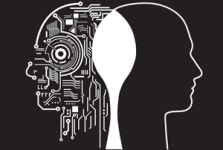What is Artificial Intelligence?
- Artificial intelligence (AI) is wide-ranging branch of computer science concerned with building smart machines capable of performing tasks that typically require human intelligence. AI is an interdisciplinary science with multiple approaches, but advancements in You do not have permission to view the full content of this post. Log in or register now. and deep learning are creating a paradigm shift in virtually every sector of the tech industry.
- Artificial intelligence is a set of algorithms and intelligence to try to mimic human intelligence. Machine learning is one of them, and deep learning is one of those machine learning techniques." - Frank Chen
HOW DOES ARTIFICIAL INTELLIGENCE WORK?
Less than a decade after breaking the Nazi encryption machine Enigma and helping the Allied Forces win World War II, mathematician Alan Turing changed history a second time with a simple question: "Can machines think?"
Turing's paper "You do not have permission to view the full content of this post. Log in or register now." (1950), and it's subsequent Turing Test, established the fundamental goal and vision of artificial intelligence.
At it's core, AI is the branch of computer science that aims to answer Turing's question in the affirmative. It is the endeavor to replicate or simulate uman intelligence in machines.
uman intelligence in machines.
The expansive goal of artificial intelligence has given rise to many questions and debates. So much so, that no singular definition of the field is universally accepted.
The major limitation in defining AI as simply "building machines that are intelligent" is that it doesn't actually explain what artificial intelligence is? What makes a machine intelligent?
In their groundbreaking textbook Artificial Intelligence: A Modern Approach, authors Stuart Russell and Peter Norvig approach the question by unifying their work around the theme of intelligent agents in machines. With this in mind, AI is "the study of agents that receive percepts from the environment and perform actions." (Russel and Norvig viii)
Norvig and Russell go on to explore four different approaches that have historically defined the field of AI:
HOW IS AI USED?
Artificial intelligence generally falls under two broad categories:
examples of Narrow AI include:
The search for a "universal algorithm for learning and acting in any environment," (Russel and Norvig 27) isn't new, but time hasn't eased the difficulty of essentially creating a machine with a full set of cognitive abilities.
AGI has long been the muse of dystopian science fiction, in which super-intelligent robots overrun humanity, but experts agree it's not something we need to worry about You do not have permission to view the full content of this post. Log in or register now..
For more information about learning in AI Technology : You do not have permission to view the full content of this post. Log in or register now. , searchenterpriseai.techtarget.com, builtin.com
- Artificial intelligence (AI) is wide-ranging branch of computer science concerned with building smart machines capable of performing tasks that typically require human intelligence. AI is an interdisciplinary science with multiple approaches, but advancements in You do not have permission to view the full content of this post. Log in or register now. and deep learning are creating a paradigm shift in virtually every sector of the tech industry.
- Artificial intelligence is a set of algorithms and intelligence to try to mimic human intelligence. Machine learning is one of them, and deep learning is one of those machine learning techniques." - Frank Chen
HOW DOES ARTIFICIAL INTELLIGENCE WORK?
Less than a decade after breaking the Nazi encryption machine Enigma and helping the Allied Forces win World War II, mathematician Alan Turing changed history a second time with a simple question: "Can machines think?"
Turing's paper "You do not have permission to view the full content of this post. Log in or register now." (1950), and it's subsequent Turing Test, established the fundamental goal and vision of artificial intelligence.
At it's core, AI is the branch of computer science that aims to answer Turing's question in the affirmative. It is the endeavor to replicate or simulate
 uman intelligence in machines.
uman intelligence in machines.The expansive goal of artificial intelligence has given rise to many questions and debates. So much so, that no singular definition of the field is universally accepted.
The major limitation in defining AI as simply "building machines that are intelligent" is that it doesn't actually explain what artificial intelligence is? What makes a machine intelligent?
In their groundbreaking textbook Artificial Intelligence: A Modern Approach, authors Stuart Russell and Peter Norvig approach the question by unifying their work around the theme of intelligent agents in machines. With this in mind, AI is "the study of agents that receive percepts from the environment and perform actions." (Russel and Norvig viii)
Norvig and Russell go on to explore four different approaches that have historically defined the field of AI:
- Thinking humanly
- Thinking rationally
- Acting humanly
- Acting rationally
HOW IS AI USED?
Artificial intelligence generally falls under two broad categories:
- Narrow AI: Sometimes referred to as "Weak AI," this kind of artificial intelligence operates within a limited context and is a simulation of human intelligence. Narrow AI is often focused on performing a single task extremely well and while these machines may seem intelligent, they are operating under far more constraints and limitations than even the most basic human intelligence.
- Artificial General Intelligence (AGI): AGI, sometimes referred to as "Strong AI," is the kind of artificial intelligence we see in the movies, like the robots from Westworld or Data from Star Trek: The Next Generation. AGI is a machine with general intelligence and, much like a human being, it can apply that intelligence to solve any problem.
ARTIFICIAL INTELLIGENCE EXAMPLES
- Smart assistants (like Siri and Alexa)
- Disease mapping and prediction tools
- Manufacturing and drone robots
- Optimized, personalized healthcare treatment recommendations
- Conversational bots for marketing and customer service
- Robo-advisors for stock trading
- Spam filters on email
- Social media monitoring tools for dangerous content or false news
- Song or TV show recommendations from Spotify and Netflix
Narrow Artificial Intelligence
Narrow AI is all around us and is easily the most successful realization of artificial intelligence to date. With its focus on performing specific tasks, Narrow AI has experienced numerous breakthroughs in the last decade that have had "significant societal benefits and have contributed to the economic vitality of the nation," according to "Preparing for the Future of Artificial Intelligence," a 2016 report released by the Obama Administration.examples of Narrow AI include:
- Google search
- Image recognition software
- Siri, Alexa and other personal assistants
- Self-driving cars
- IBM's Watson
Artificial General Intelligence
The creation of a machine with human-level intelligence that can be applied to any task is the Holy Grail for many AI researchers, but the quest for AGI has been fraught with difficulty.The search for a "universal algorithm for learning and acting in any environment," (Russel and Norvig 27) isn't new, but time hasn't eased the difficulty of essentially creating a machine with a full set of cognitive abilities.
AGI has long been the muse of dystopian science fiction, in which super-intelligent robots overrun humanity, but experts agree it's not something we need to worry about You do not have permission to view the full content of this post. Log in or register now..
For more information about learning in AI Technology : You do not have permission to view the full content of this post. Log in or register now. , searchenterpriseai.techtarget.com, builtin.com
Attachments
-
You do not have permission to view the full content of this post. Log in or register now.


 .
.